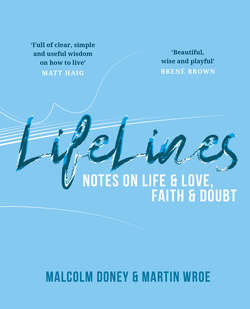Читать книгу LifeLines - Malcolm Doney - Страница 27
На сайте Литреса книга снята с продажи.
Оглавление18
Let your body do the talking
‘If it’s something you understand,’ said the fourth-century Christian teacher Augustine, ‘then it’s not God.’1
Still, throughout history, we’ve tried to understand God and then tried to capture the understanding in language. Usually in words.
In the Christian tradition people came up with creeds – formulaic collections of dogmatic statements designed to button down correct belief. And they sought to exclude what they thought was incorrect, which came to be known as heresy. It took ages. For example, the most widely agreed creed used in churches today wasn’t settled on until around 300 years after Jesus’s death. It’s framed like a legal contract. (Sign here.):
... the only Son of God,
eternally begotten of the Father,
before all worlds,
God from God, Light from Light,
true God from true God,
begotten, not made,
being of one Being with the Father.2
It’s unlikely Jesus’s friends in first-century Palestine would have addressed him using language like this, unless they were taking the rise out of his growing reputation. Most of the time he was a bit of an enigma – often quite shy about revealing himself. There were times when he even told witnesses not to let on about some remarkable act he’d been involved in.
Whatever his friends thought about him, Jesus often gave the impression he felt called to speak for God. What we know about his life suggests he was onto something that we all should know. The novelist Tim Winton puts it like this: ‘Christ is an imaginative avenue to a larger mystery, the Divine.’3
Those who choose to follow the life of compassion, healing and generosity Jesus modelled think it signals something unique. Not just what he said, but who he was. ‘A body language for God,’4 is how the theologian Mark Oakley phrases it. A body language of signs and signals, an imaginative way of communication which is less precise and more open than words. Maybe that’s why one of the earliest records of Jesus’s life says that he spoke in parables all the time: ‘Without a parable he told them nothing.’5
These stories were open to interpretation, meaning different things to different people. Pretty much like Jesus’s life itself, says Professor Nicola Slee: ‘It is a story characterised by elements of shock, surprise, extravagance and reversal, and like the parables it is a story that is open to multiple interpretation, thus respecting both the freedom and creative imagination of every reader.’6
Who we are, and how we live, may be more significant than what we believe or how we say it. As Francis of Assisi is reputed to have told his followers: ‘Preach the good news at all times and, if necessary, use words.’
